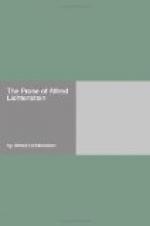Towards the end, the attacks had become more frequent, especially at night. His fainting attacks lasted longer, and the exhaustion that followed was disheartening. One evening, when Doctor Mondmilch had accepted an invitation of the veterinarian and neurologist Dr. Bruno
Bibelbauer, and had gone away for an extended time, the catastrophe happened. Little Kohn lay in bed, nearly dead. Mechenmal said: “Now, at least, he will no longer disturb anyone who he wants to sleep.” The fat idiot Backberg had a good time at the burial. The cook howled; so did the housemaid Minna. Nora Neumann shut herself up in a room; I think she wrote poetry. The Russian Recha disappeared; Lenzlich later found her in the dead man’s room. She sat on the bed, held Kohn’s hand ecstatically to her heart, and moved the lid of his right eye back and forth with her right hand. I heard how she cried and said: that was so interesting. Lenzlicht complained wistfully.
Mechenmal still says, when he speaks about little Kohn, “he was certainly crazy.” I disagree. Every person who is not stupid has experiences now and then that cannot be brought into harmony with traditional visions available to everyone. Sometimes one is more sensitive than at other times and than other people. When one is alone, familiar things are more peaceful... perhaps, in the evening, when the lamp is half-lit... in the twilight, in lonely rooms... on nights which bring no sleep. At those times sounds arise from the stillness which I have never heard, which I cannot explain. I am startled, alarmed, want, in this burning enlightenment to be with many happy people—do not want to hear... hear more finely. Stillness is shattered. Everything yawns and has sound. Objects begin to move. Evil shadows generate fear. All forms lose their familiarity. I wait for... a horrible, incorporeal wonder.
I am a firm enemy of ghosts and specters and such things. I find these appearances are not sensible or funny; I want to have nothing to do with them. And yet I could prevent the fact that, shortly before noon, the form of an ancient woman, with austere facial features, appeared to me. I was unpleasantly moved by it. Even more so, when it later occurred to me that it had possibly been my mother.
It is not less unreasonable to deny ghosts than it is unreasonable to acknowledge wonders. If ghosts were an everyday occurrence, philosophers would construct natural laws, by means of which one could derive them. And without fuss overlook them.
I shall avoid further musing on these confusing things, by taking my life. People will be shocked. Deny me the right to have control over myself. They will offer the explanation that I was at the breaking point. Supplying medical reasons. To calm themselves down; for if everyone thought so, then there would soon be a universal protest against living. Life would be boycotted. That must not happen. If you ask: why not?—you will be condemned as a sophist. People don’t like to die; the term is called life-energy. They have recourse to Gods and a more cheerful outlook on life. If misery becomes too severe, you can always go to a better insane asylum.




